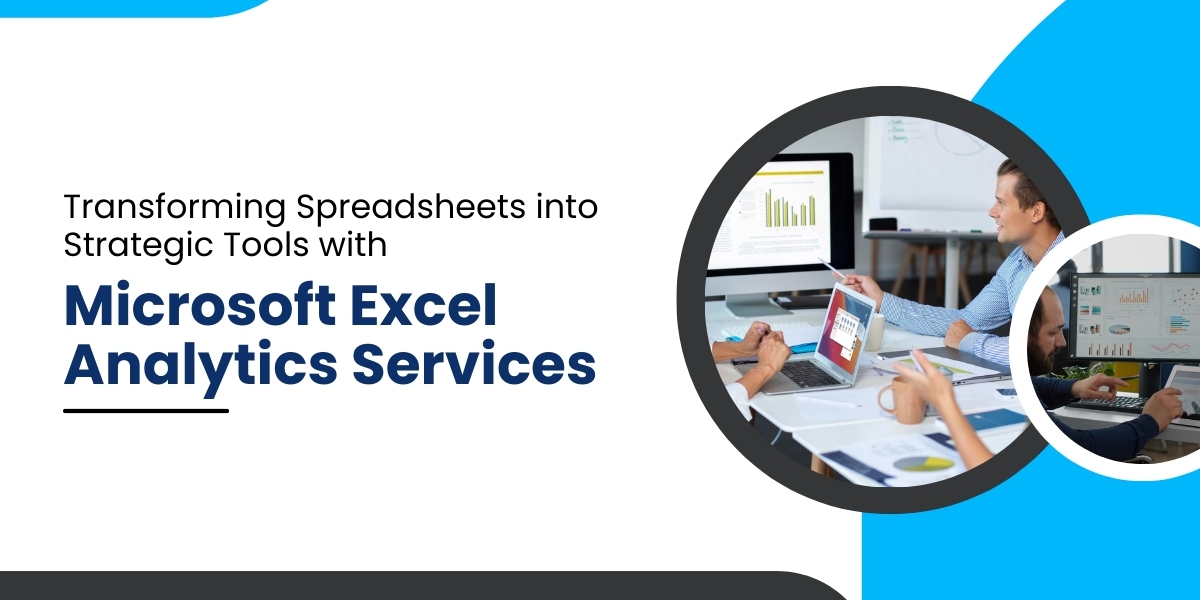In 2023, the global data analytics market was valued at $11.98 billion and is projected to grow at a compound annual growth rate (CAGR) of 23.1% from 2024 to 2030. This surge underscores the increasing reliance on data-driven insights to enhance operational efficiency, product quality, and overall competitiveness in various sectors. For enterprises, transforming traditional spreadsheets into strategic tools is essential for staying competitive in a data-driven world.
Understanding Microsoft Excel Analytics Services
Microsoft Excel has evolved beyond its traditional role as a spreadsheet application. With the integration of advanced analytics capabilities, Excel now serves as a powerful tool for data analysis, visualization, and decision-making. Key features of Microsoft Excel Analytics Services include:
Power Query: A data connection technology that enables users to discover, connect, and combine data from various sources.
Power Pivot: An in-memory data modeling component that allows users to create data models, establish relationships, and perform complex calculations.
Power BI Integration: A suite of business analytics tools that deliver insights throughout an organization, enabling users to visualize and share data.
Data Analysis ToolPak: An Excel add-in that provides data analysis tools for statistical and engineering analysis.
PivotTables and PivotCharts: Tools that allow users to summarize, analyze, explore, and present summary data.
Benefits of Using Excel Analytics Services
1. Enhanced Data Analysis
Excel's analytics capabilities enable users to perform complex data analysis without the need for specialized software. With features like Power Pivot and Power Query, users can handle large datasets, perform advanced calculations, and gain deeper insights into their data.
2. Improved Decision-Making
By transforming raw data into meaningful insights, Excel Analytics Services empower decision-makers to make informed choices. Visualizations such as charts and dashboards facilitate the interpretation of data, leading to better strategic planning and execution.
3. Increased Efficiency
Automating data preparation and analysis tasks reduces the time spent on manual processes. Excel's integration with Power Query allows for the automation of data extraction, transformation, and loading (ETL), streamlining workflows and enhancing productivity.
4. Scalability
Excel Analytics Services can handle datasets of varying sizes, from small business data to enterprise-level information. The scalability ensures that organizations can continue to leverage Excel as their data needs grow.
5. Cost-Effectiveness
Many of Excel's analytics features are included in standard Microsoft Office subscriptions, making it a cost-effective solution for organizations seeking to implement data analytics without significant additional investment.
Also Read: From Data to Strategy: How Microsoft Excel Analytics Helps You Make Informed Decisions
Real-World Applications of Excel Analytics Services
Case Study 1: Retail Sales Forecasting
A well-known retail chain faced challenges in predicting sales for the upcoming quarters. By using Excel's forecasting functions, the company was able to analyze historical sales data, identify seasonal trends, and predict future sales with surprising accuracy. This enabled better inventory management and improved customer satisfaction.
Case Study 2: Financial Reporting for Nonprofits
A nonprofit organization needed to present clear financial data to stakeholders. Using Excel's data visualization tools, the organization created interactive dashboards that simplified complex financial information. This approach enhanced transparency and facilitated better decision-making among stakeholders.
Case Study 3: Healthcare Data Analysis
A healthcare provider utilized Excel's data analysis tools to analyze patient data, identify trends, and improve patient care. By integrating data from various sources and applying advanced analytics, the provider was able to make data-driven decisions that enhanced operational efficiency and patient outcomes.
Also Read: Why Do Businesses Rely Too Much on Excel? When to Upgrade to Advanced Analytics Tools
Best Practices for Implementing Excel Analytics Services
1. Define Clear Objectives
Before implementing Excel Analytics Services, organizations should define clear objectives aligned with their business goals. Whether it's improving sales forecasting, enhancing financial reporting, or optimizing operations, having specific goals helps in selecting the appropriate tools and techniques.
2. Ensure Data Quality
High-quality data is essential for accurate analysis. Organizations should implement data governance practices to ensure data accuracy, consistency, and completeness. This includes data cleansing, validation, and standardization processes.
3. Provide Training and Support
To maximize the benefits of Excel Analytics Services, organizations should invest in training and support for their staff. Providing employees with the necessary skills and resources ensures effective utilization of the tools and fosters a data-driven culture.
4. Leverage Automation
Excel's automation features, such as Power Query and macros, can streamline data processing tasks. By automating repetitive tasks, organizations can reduce errors, save time, and improve efficiency.
5. Monitor and Evaluate Performance
Regularly monitoring and evaluating the performance of Excel Analytics Services helps identify areas for improvement. Organizations should assess the effectiveness of their analytics efforts and make adjustments as needed to achieve desired outcomes.
Conclusion
Microsoft Excel Analytics Services offer organizations a robust platform for transforming spreadsheets into strategic tools. By leveraging Excel's advanced analytics capabilities, organizations can gain deeper insights into their data, make informed decisions, and drive business success. With its accessibility, scalability, and cost-effectiveness, Excel remains a valuable asset for organizations seeking to enhance their data analytics capabilities.








